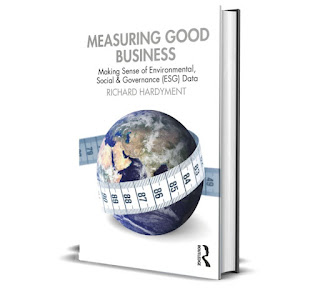A Short History of ESG
Happy Birthday ESG!!!
Guest blog by: : By Richard Hardyment Author of Measuring Good Business. Before joining the Institute of Business Ethics, he was Research Director at the World Benchmarking Alliance and a Director at Corporate Citizenship consultancy.
ESG 🍾 It’s twenty years to the day since the acronym was first coined. ESG has come of age. But with a backlash underway, and scrutiny over greenwashing, is it a milestone worth celebrating? Or is it time we retired the term?
In June 2004, Kofi Annan convened the UN Global Compact Summit. “Who Cares Wins” was published – coining the term ESG and spurring a revolution in finance. It transformed a tiny, socially responsible niche into an investor-friendly mainstream.
From birth, ESG held two promises: “better investment markets” as well as “more sustainable societies”. Today, we’d call that double materiality. But it was the hope of better risk-adjusted returns – alongside a green halo to sustain higher fees – that turbo-charged ESG’s ascendancy:
💥 2018: Majority of asset managers say they use ESG
👉 2020: One dollar in every three invested with ESG mandate in major markets
💥 2021: Two new ESG funds launched every day on average
👉2022: ESG market tops $30 trillion worldwide
Then came the backlash⚠ ESG became a political hot potato. A financial elite were accused of peddling pet causes. For these critics, ESG wasn’t commercial at all. By 2023, Larry Fink – Blackrock CEO and poster boy of ESG 👦 – claimed the term was so “weaponised” he was no longer using it. After inflation spiked, higher rates and lacklustre equity returns for many funds created further headaches.
Where next? ESG is evolving from voluntary to regulated as we standardise key terms and metrics. Yet greenwashing remains rife. For all the talk of an anti-woke backlash 🙀 the bigger threat will be a failure to live up to the hype. ESG risks looking like window dressing, full of grand promises but lacking evidence of real impact on people and planet.
I hope the term ESG becomes part of the boring furniture of finance. It should be a process for bettering risk-adjusted returns – shareholder capitalism by another name.
But, my friends, there is a broader, bolder field of sustainablefinance and responsible business where impact, ethics and consumer choice collide in a noisy debate. From brands taking a stand to impact investors wanting to change the world, let’s celebrate this wider transformational space. But let’s not call that ESG.
Are you celebrating ESG’s 20th birthday? 🎈
Just out my new book Measuring Good Business: Making Sense of ESG Data
You can
read about some of the ideas in the book:
- AI could supercharge ESG, but only if people remain in charge (Reuters/Ethical Corporation)
- Can We Trust the Numbers Behind ESG? (InvestESG)
- Measuring Ethics: The Human Factor (Institute of Business Ethics)
- Ethical Materiality - considering right and wrong alongside impact and financial returns
- Participatory Measurement: Who Decides What’s Good?
- A Short History of ‘ESG’
I was
invited to discuss the book on Frankly Speaking - A Podcast on
Responsible Business.





Comments
Post a Comment